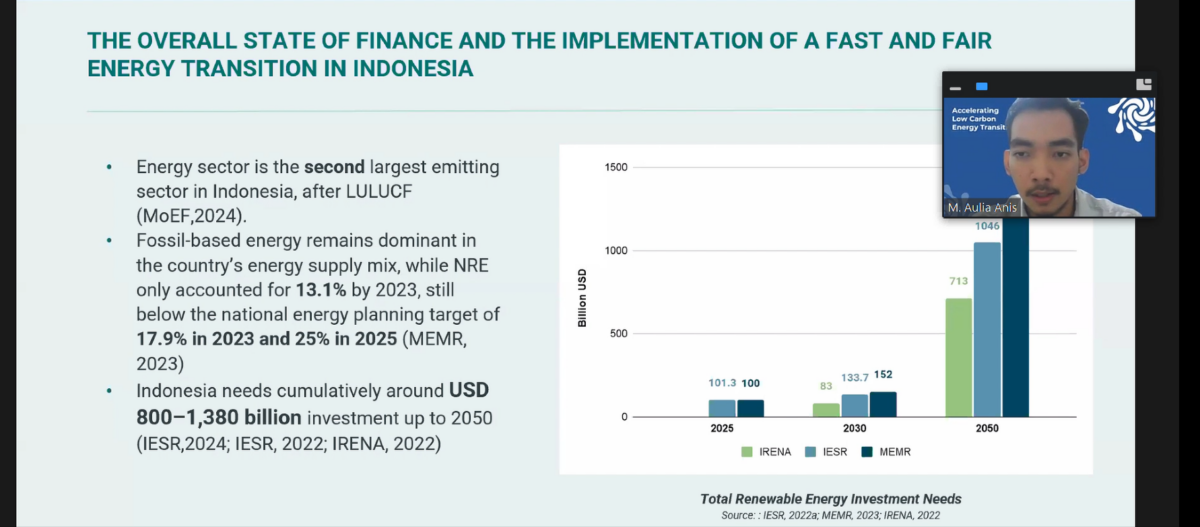Jakarta, September 26, 2024 – The Indonesian government issued the Minister of Finance Regulation (PMK) Number 103 of 2023 on October 13, 2023. PMK No.103/2023 aims to provide fiscal support through a funding and financing framework to accelerate the energy transition in the electricity sector.
Based on the Climate Policy Implementation Check 2024 assessment conducted by the Institute for Essential Services Reform (IESR), this PMK provides a legal umbrella to support investment in renewable energy development and accelerate the early retirement of coal-fired power plants through the Energy Transition Platform managed by PT SMI.
This regulation allows funding for the energy transition platform to be sourced from the State Budget (APBN) and other legal sources, such as international funding cooperation. This policy follows Presidential Regulation Number 112 of 2022 concerning the Acceleration of Renewable Energy Development for Electricity Supply.
However, IESR encourages a more effective implementation of PMK 103/2023 by clarifying its governance, prioritizing transparency in decision-making, and allocating APBN financing for funding support for this platform.
The Executive Director of IESR, Fabby Tumiwa, said that PMK No. 103/2023 is the basis for allocating the state budget to support the early termination of PLTU operations and accelerate the achievement of renewable energy development targets.
IESR estimates the investment to achieve decarbonization in the energy system at USD 30-40 billion per year or a total of USD 1,380 billion until 2050. Meanwhile, to be in line with the achievement of the global temperature increase target of 1.5 degrees Celsius, 2 – 3 GW of coal power plant capacity needs to stop its operation gradually every year until 2045; according to him, funding from APBN sources is required to make the transaction from the termination of PLTU operations financially feasible.
“Financing the operational termination of coal-fired power plants through the state budget is expected to include power plants owned by PLN. The implementation of coal-fired power plants (CFPP) retirement also needs to consider several determining factors, such as the age of the CFPP, which reaches at least 20 years or has passed its economic age, the use of subcritical coal PLTU technology, which produces very high emissions and is carried out in an electricity system with overcapacity. In addition, it is also necessary to pay attention to the impact on energy security and the financing mechanism,” said Fabby.
According to Fabby, funding from the state budget will close the gap in funding for early termination of PLN’s PLTU operations from abroad or international financial institutions due to several issues regarding the valuation of the PLTU’s value. Funding from the state budget is the most possible in this condition.
In addition, Fabby added, terminating the operation of PLN’s CFPP would divert the compensation funds to PLN’s treasury, strengthening PLN’s capital to make more significant investments in renewable energy generation and electricity transmission.
IESR’s Climate Policy Implementation Check study highlights three aspects that must be considered in implementing PMK No. 103/2023 to ensure a fair and sustainable energy transition. First, cross-sector policy harmonization is needed to ensure that this PMK aligns with related policies, such as domestic component level (TKDN) requirements, coal domestic market obligations (DMO), fossil fuel subsidies, and other fiscal regulations. Second, transparency reporting mechanisms and policy evaluation should be improved, which this regulation has not included. Third, as the platform manager, PT Sarana Multi Infrastruktur (SMI) must strengthen its mandate to access more significant financial resources. In addition, the platform needs to have a clear framework for cost recovery mechanisms.
Program Officer of Just Transition, IESR, Muhammad Aulia Anis said that in 2022, the climate mitigation budget allocation from the state budget for the energy and transportation sectors will reach IDR 19.5 trillion or around USD 1.3 billion. This amount shows that the government is committed to supporting the energy transition. However, this investment is still far from the amount needed to accelerate an equitable energy transition, thus requiring more public and private funding sources.
“Indonesia’s energy transition requires strategic steps that not only accelerate the use of renewable energy but also address gaps in institutions, oversight and financing. The government needs to continue strengthening collaboration with various stakeholders to realize a rapid, equitable and sustainable energy transition,” said Aulia.

